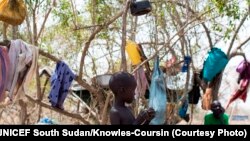"When we hear the gunshots, we all come together. We start to pray and we are crying,” Wasuk said.
She was convinced someone was coming to kill her, and weeks later is still too shaken by the memory today to spend much time outdoors.
“When I am walking outside there, we remember that... When even I see someone who is going with a gun, I will say that he is coming to shoot me. So I fear to go to the road,” said Wasuk.
CCC Director Cathy Groenendijk said it has been more than two months since the fighting stopped in Juba, but she still has a hard time convincing the children they are safe.
"They don’t go outside, like to the market, where they used to go before," she told VOA.
"They stay within the compound and they tell each other not to move up and down. Sometimes, if they hear sporadic shooting, it reminds them of that day,” she said.
That day was December 15, when political in-fighting in the ruling SPLM party boiled over into violence in Juba.
The fighting rapidly spread around the country, and continues in parts of Jonglei, Unity and Upper Nile states to this day, in spite of a ceasefire agreement that was signed in January. Thousands have died in the clashes between pro- and anti-government forces, and at the peak of the conflict, more than 900,000 people had fled their homes.
South Sudan's children witnessed unspeakable acts of brutality during the unrest, Doune Porter, the chief of strategic communications for the U.N. Children’s Fund (UNICEF) in South Sudan, said.
“Many of them have seen their parents killed in front of their eyes, or seen relatives, friends, neighbors killed. It’s been devastating for many children,” she said.
"There are widespread reports of grave violations of humanitarian law, with the effects of the conflict on children particularly devastating," UNICEF said in a statement released Monday.
"Over the past two months, girls and boys have been killed, maimed, raped, orphaned, recruited into armed groups, and made homeless," the U.N. agency said.
Half of the nearly 900,000 people who have been forced from their homes in South Sudan are children, and many of them have been separated from their parents as they fled violence in their villages.
Porter said children need special attention to recover from trauma, but South Sudan doesn't have trained psychologists to help them get over what they've been through.
There are widespread reports of grave violations of humanitarian law, with the effects of the conflict on children particularly devastating.UNICEF
So the U.N. and NGOs like CCC do what they can for the children.
Child-friendly spaces have been set up at the U.N. Mission in South Sudan compounds in Juba where "young children can go and play and sing and do some basic learning," Porter said.
UNICEF is working with partner organizations to trace children who have been separated from their families in the fighting and is providing basic education facilities in areas where there are large groups of displaced families because, it says, education is "a vital step for children whose lives have been so traumatically disrupted."
But healing will come slowly for children like 11-year-old Kakule Helen, who still runs and hides every time she hears something that sounds like a gunshot.
"I hear the gun... I run from here. I am not eating. I go under the bed down there," she said at the CCC compound where she and some 40 other orphaned or abandoned children are being helped to slowly piece together young lives that have already had to endure huge loss and emotional trauma.
